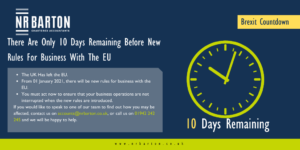The UK has left the EU and there are now only 10 days remaining before we will be forced to face new rules for business with the EU. Additionally, we will also be forced to face a range of different protocols, especially when planning to travel abroad. These may include renewing your passport, taking out travel insurance and doing a money-makeover; we will discuss all of these in this article.
Firstly, businesses: you need to ensure that your business is fully prepared for the new rules to prevent your business operations from being interrupted in the New Year.
The top actions which you can take now to prepare are:
- Check the new rules on importing and exporting goods between the EU and Great Britain from 1 January 2021. Different rules will apply in Northern Ireland.
Your business could face delays, disruption or administrative costs if you do not comply with new customs procedures from 1 January 2021.
- Use GOV.UK to identify changes affecting manufactured goods, such as new marketing requirements or approvals needed, to ensure your business is ready to sell them in the UK and EU.
You may not be able to sell your goods in the UK and the EU from January 2021
- If you are planning to recruit from overseas from 1 January, you will need to register as a licensed visa sponsor.
You may not be able to legally hire people from outside the UK if you do not have a license. New employees from outside the UK will also need to meet new job, salary and language requirements. Irish citizens and those eligible under the EU Settlement Scheme are not affected.
- If you are moving goods into, out of or through Northern Ireland, check the latest guidance.
At the end of the transition period, the Northern Ireland protocol comes into force. There will be no special provisions which only apply in Northern Ireland so if you move goods into, out of, or through Northern Ireland make sure you check the latest guidance at: gov.uk/northern-ireland-trade
The Government is providing a range of support, including webinars to walk you through the changes. These are available to watch on demand at: gov.uk/transition-webinars. You should also check with your suppliers and customers that they are taking action.
These are challenging times, but the transition period is ending on 31 December 2020 and there will be no extension. Unless you take action, there is a risk your business operations will be interrupted. The government will be there to help you to take advantage of the many new opportunities that being in an independent trading nation will bring.
If you have any questions about how these changes may affect you, please contact your usual Partner or Manager, who will be happy to help.
Now, even if you don’t run a business, there are still some things that you can do to ensure that you are personally ready for Brexit.
- Check how long you have left on your passport:
This year, restrictions caused by coronavirus have resulted in our passports being put aside and forgotten about. From 01 January 2021, British people wanting to travel abroad to the EU will need at least 6 months left on their passport before it expires, and the passport will need to be less than 10 years old or they may not be able to travel.
However, these new rules do not reply when travelling to Ireland.
- Take out travel insurance
Previously when travelling abroad, British people have been able to carry their European Health Insurance Card (EHIC) which gives you the right to free emergency healthcare during a temporary stay in another European country.
However, from 01 January 2021, this will no longer be valid if a trade agreement with the EU is not reached.
- Do a money-makeover
It is hard to say what is going to happen to the economy in the New Year. Will the price of houses or bread, milk, fish and chips etc. go up? Will it go down? The simple answer is… we don’t know.
However, to ensure that you are fully prepared for any scenario, now would be a good time to have a sit down and work out your finances; total up how much money you have coming in vs how much money you have going out.
A few more tips to ensure that you are saving money and not overpaying include checking that you are in the right council tax band, switching your gas and electricity supplier, and haggling before renewing things such as car insurance and mobile phone contracts.
- Use a credit card when buying items online from the EU
From 01 January, British people will still have 14 days to return unwanted online items they have bought from the EU. However, it may become increasingly difficult to sort out any disputes with retailers.
British people will no longer be able to use the EU’s Online Dispute Resolution scheme, which gives consumers access to tools to help resolve a complaint, and it might also be more difficult to take a retailer to court in the UK.
This means that, if you’re able to, it’s worth buying items which cost between £100 and £30,000 with your credit card, according to Citizens Advice. This also applies to purchases you make while abroad.
This is because Section 75 protection applies, which guarantees that if you buy a product from the EU and you don’t receive it, you can claim the money back from your card provider.
- Check how much it will cost to use your phone
When abroad, it is still nice to keep in contact with those back home. However, in the new year free roaming is no longer guaranteed so it is worthwhile checking with your provider before you travel to prevent a nasty phone bill when returning to the UK.
- If you are a British expat, check your bank
Thousands of British expats have been told their bank accounts could be closed once the Brexit transition period ends.
This is because UK banks will no longer be allowed to provide services to customers in the EU without the right banking licences.
Previously they have used a system known as passporting, which allows banks to trade freely in another other country in the European Economic Area (EEA) without the need for more authorisation.
But this will no longer be in place after 01 January 2021, so banks have been left needing to ensure they meet the rules for every EEA country’s regulators.
Some banks have decided it is not in their commercial interests to jump through these hoops and continue accounts for expats, so it may be worth checking with your bank as to whether you may be affected.





